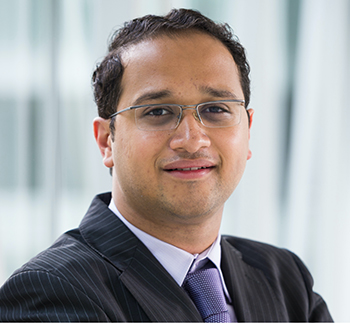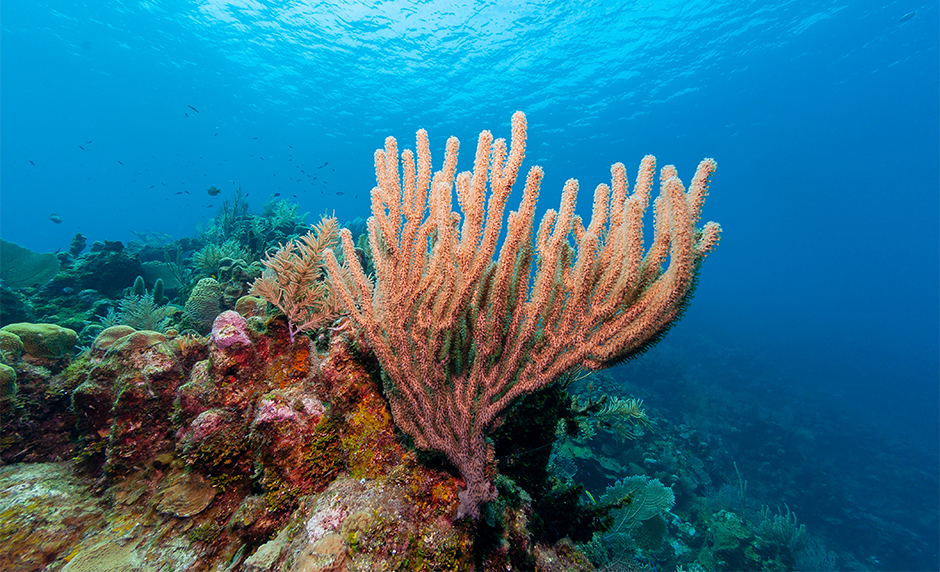Recognizing the value of coral reefs in reducing erosion, flooding, and storm damage, the United States Defense Advanced Research Projects Agency (DARPA) has selected a team of University of Miami faculty to develop hybrid reefs that combine the wave-protection benefits of artificial structures with the ecological benefits of coral reefs.
As part of DARPA’s nationwide Reefense research program, The University of Miami Rosenstiel School of Marine and Atmospheric Science will be the top recipient of funding for the $7.5M grant. Rosenstiel School researchers will lead the development of innovative hybrid biological and engineered reef structures designed to accelerate the protection of vulnerable coastal regions in Florida and the Caribbean.
The Reefense research team also includes experts from across the University including professors from the College of Engineering and the College of Arts & Sciences. Dr. Vivek N. Prakash, assistant professor in the College’s Physics Department, says he is excited to be a part of this large multi-institutional project.

“This project is comprised of a dream team of internationally renowned scientists in coral biology, hurricanes, coastal/structural engineering, and materials science,” said Prakash. “I hope to contribute my unique marine organismal biophysics expertise to addressing problems in coral reefs and their restoration efforts.”
The overall goal is to develop, test, and deploy coral-reef-mimicking structures that provide immediate protection from waves and which are also self-building, self-repairing, and resilient to climate change. “My lab will carry out boundary-layer hydrodynamics modeling of the reef at small length scales, using both experimental and computational approaches” said Prakash.
Prakash’s lab work focuses on investigating biologically relevant questions in marine animals and uses physical approaches to truly understand animal behaviors in their natural environments. He also holds secondary faculty appointments in the Biology Department in the College of Arts & Sciences and the Marine Biology & Ecology department at the Rosenstiel School Campus. “I regularly interact with my Biologist colleagues in these two departments, which has led to unique collaborative opportunities such as this DARPA project,” he added.
Andrew C. Baker, professor in the Department of Marine Biology and Ecology and director of the Coral Reef Futures Lab at the Rosenstiel School, will serve as principal investigator for the DARPA project and lead a collaborative research team that includes partners at major academic institutions from across the nation.
“We will be working on next generation structural designs and concrete materials, and integrating them with novel ecological engineering approaches to help foster the growth of corals on these structures,” said Baker. “At the same time, we will also be testing new adaptive biology approaches to produce corals that are faster-growing and more resilient to a warming climate.”
The new Miami-based project, called X-REEFS (neXt generation Reef Engineering to Enhance Future Structures) was incubated through the University’s Laboratory for Integrative Knowledge (U-LINK), a program which encourages the formation of interdisciplinary teams to address pressing societal issues. In this case, the challenge was how to protect the highly urbanized, low-lying sections of South Florida threatened by storm surge and coastal inundation.
Brian K. Haus, professor and chair of the Department of Ocean Sciences, is co-principal investigator for the initiative. He is also the director of the Rosenstiel School’s Alfred C. Glassell, Jr. SUSTAIN Laboratory (SUrge-STructure-Atmosphere INteraction), a world-leading facility for studying the complex air-sea interactions of wind, waves, storms, and shorelines. In collaboration with Landolf Rhode-Barbarigos, assistant professor in the College of Engineering, Haus has been using the SUSTAIN facility to understand the benefits of hybrid artificial coral reefs for coastal protection.
Support from SECORE
SECORE International, Inc., a leading conservation organization for the restoration of coral reefs, will also play an active role in the Reefense program, with Miami-based research director Margaret W. Miller, Ph.D., also serving as a co-principal investigator. Miller is a former research ecologist at the NOAA Southeast Fisheries Science Center on Virginia Key, and a longtime collaborator with Rosenstiel scientists.
The Reefense research team also includes global experts in how reefs diminish wave energy from the University of California Santa Cruz; structural engineers and coral genetics experts from Pennsylvania State University; materials scientists from Johns Hopkins University and Texas A&M University; experts in reef ecology, coral breeding, and resilience from The Florida Aquarium, Florida International University, and the University of Florida; and chemical ecologists from the Smithsonian Marine Station.
Global engineering firm AECOM will provide overall project management support as well as coastal engineering expertise that includes structural analysis and design of reef structures to withstand storms and sea-level rise.

